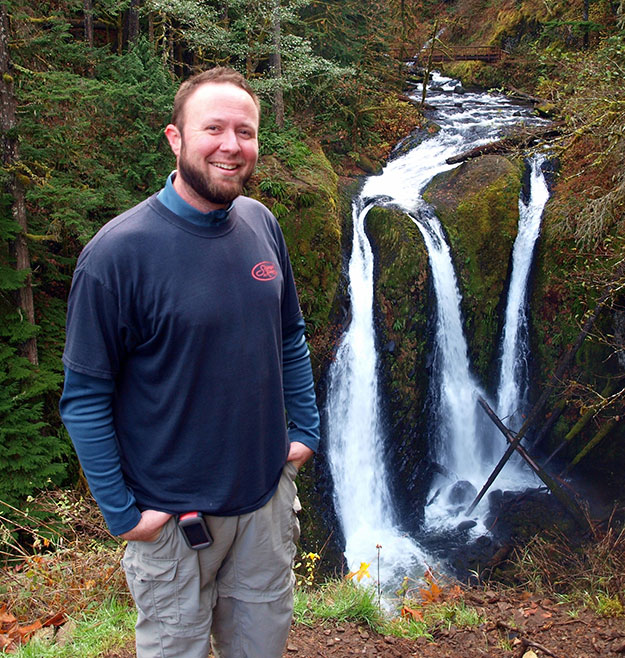Like many veterans, Adam Sawyer's addiction began with a simple prescription for Percocet. Now an outdoors and travel writer, photographer, author and public speaker, his habit developed into a problem when working in the medical field, which gave him easy access to the drugs.
"I developed a very severe addiction to opiates," Sawyer recounted. "By the time I got caught, I was prescribing myself so much Percocet that they thought I was selling it. When I was placed in a jail cell for a few days, I went through pretty severe withdrawals before being released to await the investigation and trial."
Sawyer was a good airman, and 20 years ago the military viewed addiction more as a self-discipline and personal accountability issue rather than an illness, so they gave him a chance at redemption.
 "The next six months I spent raiding dorm rooms for prescriptions and forging my own at pharmacies around town," he said. "I would be arrested, thrown in a cell, suffer withdrawals, and go out and do it all over again. It was hell, and they couldn't understand why I was doing that to myself and why I couldn't just straighten up and fly right. That was the bottom for me. That time, anyway."
"The next six months I spent raiding dorm rooms for prescriptions and forging my own at pharmacies around town," he said. "I would be arrested, thrown in a cell, suffer withdrawals, and go out and do it all over again. It was hell, and they couldn't understand why I was doing that to myself and why I couldn't just straighten up and fly right. That was the bottom for me. That time, anyway."
Jailtime and a dishonorable discharge resulted, but as brutal as detoxing in jail was, it started his road to his first recovery.
Jump forward a decade, to when Sawyer was living in the Pacific Northwest while undergoing a divorce and a career change into writing and photography. In a moment of weakness, he succumbed to a friend's offer and found himself in a bathroom smoking black tar heroin from a sheet of tinfoil.
Two years later, he was a full-blown addict, losing relationships and jeopardizing his new career as an outdoor and travel writer.
"This time I was able to get admitted into a 10-day detox program before any run-ins with the law," recalled Sawyer. "I was also provided invaluable insight and counseling that armed me with the knowledge and the tools for a successful, long-term recovery strategy. I am hardly the poster boy for textbook recovery, but I recognize that, along with the rest of my shortcomings, and strive to keep myself in a good position to maintain it.
"The thing that helped me the most," he continued, "besides the love and support of family and friends, was getting back outside. Mother Nature had been my drug of choice before losing my way, and she would prove to be the path back to real life. Every slow mile spent on a trail got my body stronger. Hours of introspection in the woods helped focus my mind. And the inspiration of witnessing a fire-scorched forest reborn into an open meadow of wildflowers paralleled my own journey and helped my soul sing again."
Exploring the outdoors in Oregon helped Sawyer in his recovery, but it was not a formal program. As more people discover the benefits of wilderness therapy, there are programs that are geared towards veterans suffering from post-traumatic stress disorder (PTSD), a condition in which chemical dependency on drugs or alcohol are often used as a coping method.
Outward Bound is considered one of the top providers of experiential and outdoor education programs for youths and adults nationally. The company is now offering weeklong courses for veterans at no charge. These programs use the challenge of the natural world as a pathway to healing.
Joshua Brandon, an Iraq War veteran, found the healing power of nature through mountaineering expeditions to Mount Rainier, which led him to found his own nonprofit, Hound Summit Team. One of the things he found is that although he could see the changes in his fellow veterans, it was anecdotal and there was very little research on the subject. He has since partnered with REI, which provided grant money, and the University of Washington to conduct a two-year pilot study to document the positive effects hiking expeditions have on veterans with PTSD.
Sawyer has shared his story hoping it can help other veterans struggling with addiction and recovery.
"Pride go-eth before destruction. If you're a veteran, you're inherently strong," said Sawyer. "Getting assistance is not a weakness. With addiction and recovery, you prove your strength by acknowledging the problem, getting help, and putting in the hard work it takes to get through it and live a full life on the other side.
"Also, know that there are many ways to get help," Sawyer continued. "Recovery is not a one-size-fits-all affair anymore. Find what works best for you. And if you stumble it's ok. It doesn't mean you've failed, and it doesn't mean you have to spiral completely out. Even if you do, the struggle back up will always be worth it. Always."
The Veterans Administration (VA) offers a variety of drug addiction recovery programs. Contact your local VA center for more information. A list of programs and facilities can be found at va.gov and vetcenter.va.gov.





Read Comments